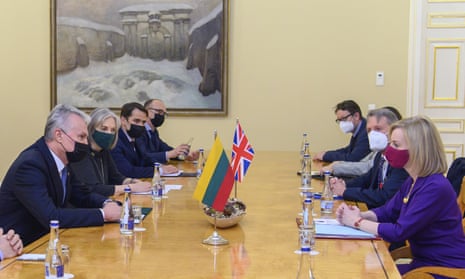Western sanctions must be extended to include all Russian banks, ending the carve-out for energy-related Russian institutions, the UK foreign secretary has said following a meeting in Vilnius with foreign ministers from the three Baltic countries.
Liz Truss said the UK “was trying to make sure the Russian economy is crippled so that it can no longer be able to fund its war machine”, adding that she hoped the Russian people would draw their conclusions if this happened.
She praised the Russian demonstrators protesting against what she described as Putin’s war of choice, adding: “I do not believe Putin speaks on behalf of the Russian people.”
A group of energy-dependent countries within the EU have successfully argued that that some major Russian banks including Gazprombank and Sberbank should not be kicked out of the Swift international payments system.
If Gazprombank was excluded from Swift gas and oil imports from Russia into Europe would become increasingly difficult, forcing up prices even higher.
But Truss said: “We need to make sure no Russian bank has access to Swift.” She added that the west had two clear objectives: “Vladimir Putin must fail in this horrific enterprise and his ambitions go no further.”
Some Baltic States want a no-fly zone be implemented, but the US and UK oppose this on the grounds it could lead to a direct conflict with Russia.
British troops lead a joint expeditionary force in Estonia that has been strengthened by doubling the number of UK forces in recent weeks as the Russian threat to Nato countries has grown. Truss added that UK intelligence was working more closely with Lithuania to look for any evidence of Russian troop buildups in the Suwalki gap, a narrow strip of land between Belarus and Russia’s Kaliningrad exclave.
She said the west’s weapons were being used to stop Putin’s tanks, but that more needed to be done. “This is a struggle not just for Ukraine’s freedom and self-determination, but for all of our freedom and security. By continuing to respond with strength we will together ensure that Putin loses.”
She confirmed she would personally attend an EU meeting of foreign ministers on Friday, despite Britain having left the bloc, where she will raise the issue of further sanctions on Belarus. She will attend alongside the Ukraine foreign affairs minister, Dmytro Kuleba, and the US secretary of state, Antony Blinken.
She will also attend a Nato meeting on Friday where foreign ministers are due to have a larger discussion about a change in defence strategy.
